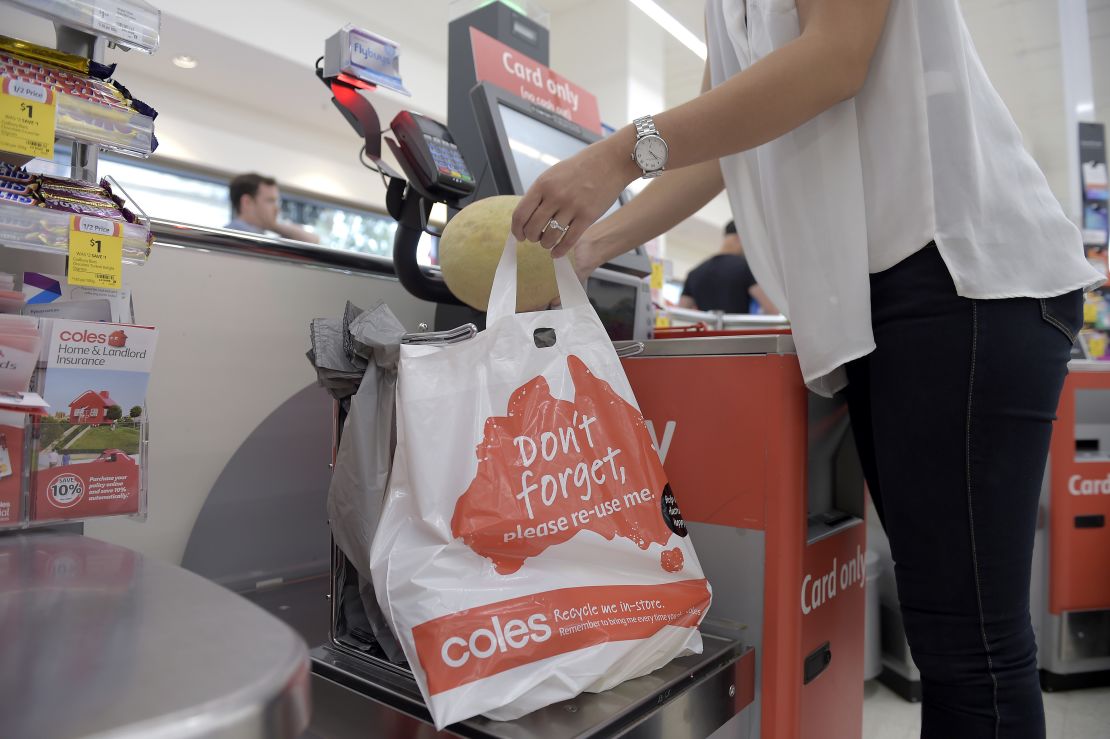One of Australia’s top retailers has backed down over a plan to charge customers for plastic bags, in a move that has enraged the country’s environmental campaigners.
Supermarket chain Coles said Wednesday that it was dropping plans to charge for the bags, saying shoppers had struggled to adjust to the change.
But Greenpeace Australia Pacific said the decision to give away plastic bags for free was a “betrayal” and would increase the amount of plastic pollution in the environment.
“This decision makes a complete mockery of Coles’ claim to want to reduce plastic waste and is a betrayal of the millions of their customers who want the supermarket to do the right thing in favor of a vocal minority,” Zoe Deans, a campaigner at Greenpeace Australia Pacific, said in a statement Wednesday.
“Coles have caved in far too quickly.”
Both Coles and its primary competitor Woolworths joined supermarket chains around the world in recent months by banning free, single-use plastic bags.
Coles introduced thicker, reusable plastic bags as a replacement, which customers had to buy for 15 Australian cents (11 cents).

‘Insane’
Single-use lightweight plastic bags are banned in most states and territories in Australia, with the exception of New South Wales and Victoria.
The Coles bags are considered reusable, and therefore not included under the regional bans.
Originally Coles said it would temporarily provide the new reusable bags for free while customers adjusted to its new decision, but in a reversal, the company now says it will stop charging for the new thicker bags altogether in most of its stores.
“Some customers told us they needed more time to make the transition to re-usable bags,” a spokesperson for Coles told CNN, adding that even customers bringing bags from home still found themselves needing more.
Craig Reucassel, comedian and host of Australian television series “War on Waste,” called the decision by Coles “insane,” and suggested the supermarket hadn’t given shoppers enough time to adjust to the 15 cent charge. “(It) would change people’s behavior over time,” he wrote on Twitter.
The move will be seen as a victory for Australian conservative activists who had been vocally calling for an end to the ban since its introduction.
One of the most vocal campaigners, newspaper columnist and television host Andrew Bolt, wrote in his regular opinion column he believed the reusable bags were even dangerous for people’s health.
“It’s bad enough that Woolworths wants to stuff its customers around with its pointless new plastic bags ban, but must they die for the planet as well?” Bolt wrote on June 25.
A West Australian union for supermarket employees told local media Nine News checkout workers had even been attacked over the plastic bag charge.
The Coles spokesperson said the decision not to charge for the bags was “an interim measure,” but did not specify an end date.
Worldwide efforts to ban plastic
Coles – owned by conglomerate Wesfarmers – is one of Australia’s biggest supermarket chains with almost 2,500 stores across the country.
Despite the decision, the retail firm has previously outlined commitments to reducing its plastic consumption. In June, it said it wants to make all of its own-brand food packaging recyclable within two years.
Retailers and governments around the world have been stepping up efforts to cut how much plastic they use.
Iceland, a major British supermarket chain, earlier this year pledged to stop packaging its own products in plastic within five years.
Swedish furniture giant Ikea has similarly promised to phase out all single-use plastic products from its shops and restaurants by 2020.
In India, the government of Prime Minister Narendra Modi wants to eliminate single-use plastic by 2022.
Following a levy on plastic shopping bags introduced in the United Kingdom, a study found that there were nearly 30% less plastic bags on the seabeds surrounding Britain.






















